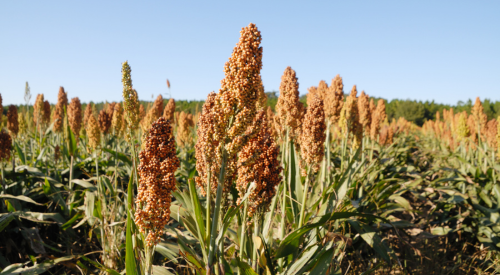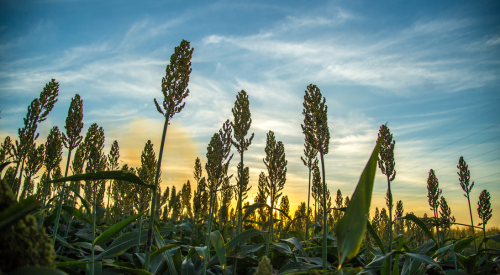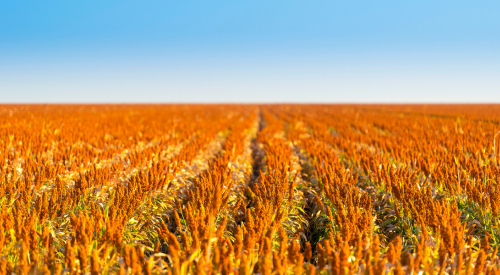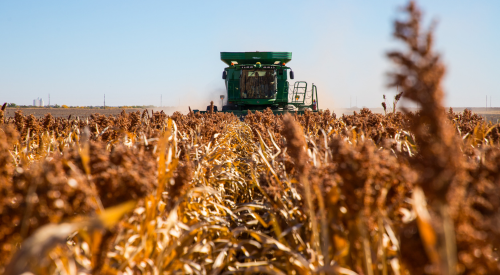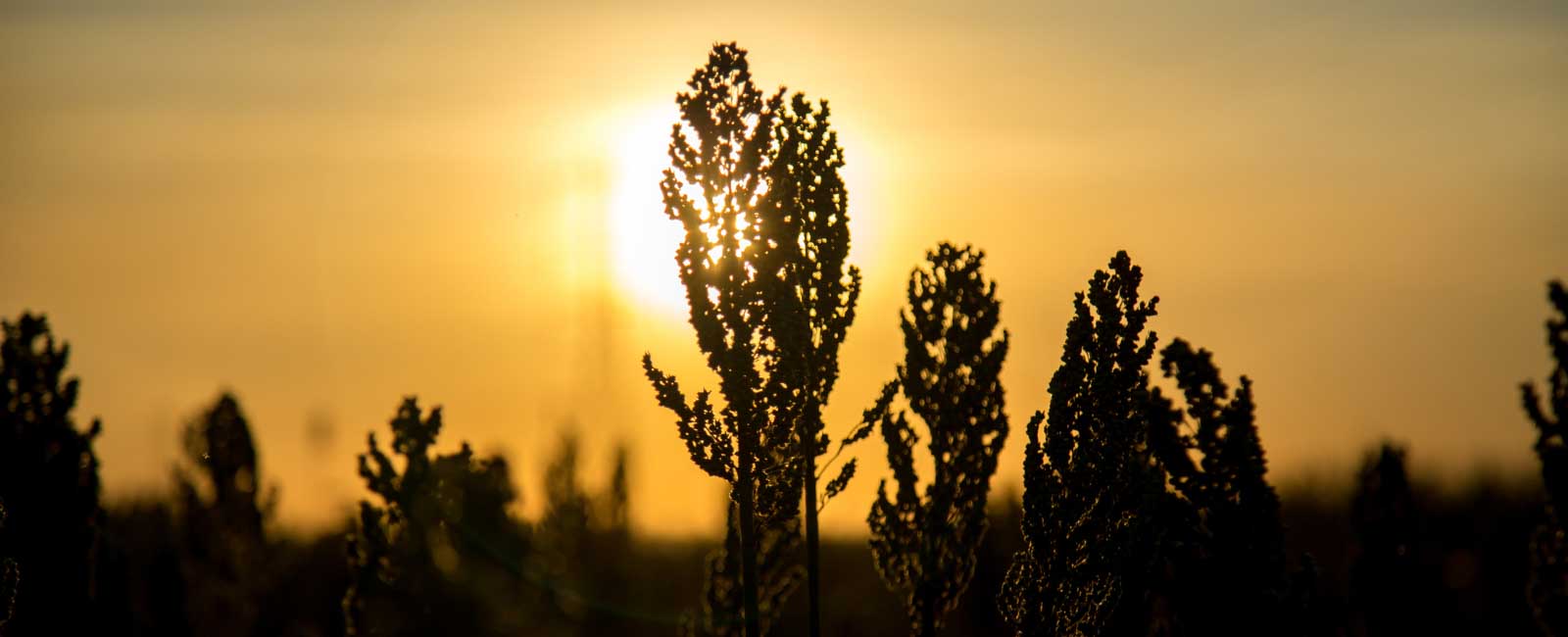
Sorghum Breeding
“Because of its versatility and adaptation, sorghum is one of the really indispensable crops required for the survival of humankind.” – Jack Harlan, 1971
Sorghum is an ancient grain vital to western Kansas's agricultural and economic heartbeat. Our Sorghum Research and Breeding programs are committed to environmentally and financially sustainable farming practices in western Kansas. Since 1902, researchers have been working to optimize sorghum varieties and growing practices in the arid and semi-arid plains. We seek practical solutions for sorghum growers seeking ways to increase yield potential by developing elite parental lines and hybrids with drought tolerance, disease, and insect resistance. Our sorghum research and extension programs also delve into the sustainability of sorghum in midwest cropping systems to advance soil health, make the most of limited water conditions, and enhance sustainable farm profitability.
“We hope that our work will open a wider marketing opportunity for sorghum as a biofuel feedstock, and hopefully for producers, the opportunity to gain additional value in the grain sorghum they are selling into the ethanol market.” ~ Peter Tomlinson, Kansas State University Associate Professor, Environmental Quality
Kansas Grain Sorghum
In western Kansas, water scarcity can significantly threaten crop production, and sorghum has proven to be a reliable and sustainable choice for farmers. Kansas consistently leads the nation as the number one grain sorghum-producing state, with approximately 3 million acres planted annually. According to estimates prepared by the Kansas Department of Agriculture, the sorghum industry in Kansas has a direct output of roughly $686.1 million and creates 1,737 jobs in the state. Indirectly, the sorghum industry supports an estimated 5,152 jobs and makes a total economic contribution of approximately $1.2 billion.
Kansas consistently leads the nation as the number one grain sorghum-producing state, with approximately 3 million acres planted annually. According to estimates prepared by the Kansas Department of Agriculture, the sorghum industry in Kansas has a direct output of roughly $686.1 million and creates 1,737 jobs in the state. Indirectly, the sorghum industry supports an estimated 5,152 jobs and makes a total economic contribution of approximately $1.2 billion.
Grain Sorghum a Versatile and Sustainable Crop
Sorghum is a versatile crop used for grain, forage, or sweet crop that contributes significantly to western Kansas's economic prosperity. While Kansas sorghum has traditionally been used for livestock feed as grain and forage, there is an increasing demand for its use in ethanol plants. Sorghum has been found to use a third less water while generating the same amount of ethanol per bushel as comparable feedstocks. There is also a growing interest in its domestic production of sorghum as a gluten-free food crop and an excellent substitute for wheat in foods. The diverse applications of sorghum and its water efficiency make it a cornerstone of the regional economy.
Beyond its economic importance, sorghum contributes to crop rotation strategies, promoting soil health and sustainability. The use of sorghum in crop rotations can help prevent soil erosion, improve fertility, reduce reliance on chemical inputs, break up soil disease cycles, and produce yield advantages for other crops in the rotation, fostering a more environmentally conscious and resilient agricultural system.
With its remarkable drought tolerance and adaptability to varying soil conditions, sorghum is resilient against the challenging weather patterns that often characterize the semi-arid plains of western Kansas. Sorghum isn't just a crop in western Kansas; it symbolizes resilience, adaptability, and economic vitality. Its significance reaches far beyond the fields, impacting the livelihoods of farmers, the sustainability of the environment, and the overall prosperity of the entire region.
Forage Sorghum
"Depending on the producer's goal, with sorghum we have the ability to graze, hay, or put it into silage. It's one of the advantages of sorghum, with all of the different sorghum types that are available. Once a producer identifies what his or her goal is, then we can select a sorghum type and variety to match the grower's needs." ~ John Holman, Cropping Systems and Forage Agronomist
Grain Sorghum Research
The major focus of sorghum research at KSU, ARC, Hays, KS for the semi-arid regions of Kansas is to increase yield potential through the development of elite parental lines and hybrids with chilling/heat and drought tolerance at pre-flowering and post-flowering stages, lodging and diseases resistance (Fusarium stalk rot, charcoal rot, and grain mold), insect resistance (sugarcane aphids) and herbicide tolerance to minimize the weeds competition and enhanced productivity in Kansas. Also, the program aims to accelerate the breeding process by integrating markers assisted selection (MAS) to develop tannin free chilling tolerant parents though multi-disciplinary and multi-institutional collaboration. Other major priority areas are to: i) develop and commercialize K-State sorghum high yielding hybrids in partnership with private seed industries with improved agronomic characteristics for the direct benefit of Kansas sorghum growers. Ii) develop parental lines with improved sorghum specialty traits (high polyphenol and antioxidant) to add value to anti-cancer properties and iii) generate next-generation classical breeders through short-term hands-on training courses every year in collaboration with national and international institutes.
Meet Our Research and Extension Specialists
- Ramasamy Perumal, Sorghum & Millet Breeder
- Lucas Haag, NW Area Agronomist
- Jeanne Falk-Jones, Multi-County Agronomist
- Logan Simon, SW Area Agronomist
- John Holman, Cropping Systems Specialist
KSRE Grain Sorghum Resources
Our dedicated extension officers across Kansas are committed to offering valuable research and data to enhance grain sorghum production in the Midwest. In the KSRE Bookstore you'll find the latest research on Sorghum Insect Pest Mangement, Performance Tests, Growth and Development publications, and so much more.
As the leading state in wheat and grain sorghum production, Kansas boasts rich soils and diverse climatic conditions, influencing optimal planting dates and seeding rates. Recognizing and understanding these variations addressed in the KSRE Grain Sorghum Planting Guide is crucial for producers to make informed decisions tailored to the unique growing conditions on their farms.
The Kansas Agricultural Experiment Station faculty members conduct ongoing research in grain and forage sorghum. The KAES Research Reports share preliminary results of research conducted at the Western Kansas Research-Extension Centers.
History of Sorghum at the WKREC
Since 1902 we've been serving Kansas farmers seeking to increase yields, sustainability, and farm profitabililty.
Grain Sorghum News
Title: Agriculture Today Podcast - Sorghum Hybrids for Early Planting
Date: Sept 11, 2020
Description: K-State sorghum breeder Ram Perumal talks about his program's efforts to develop sorghum hybrids which can be successfully planted very early in the spring, and he remarks on the multiple advantages of such early plantings...he spoke on this at the recent fall field day conducted by K-State's Agricultural Research Center at Hays.
